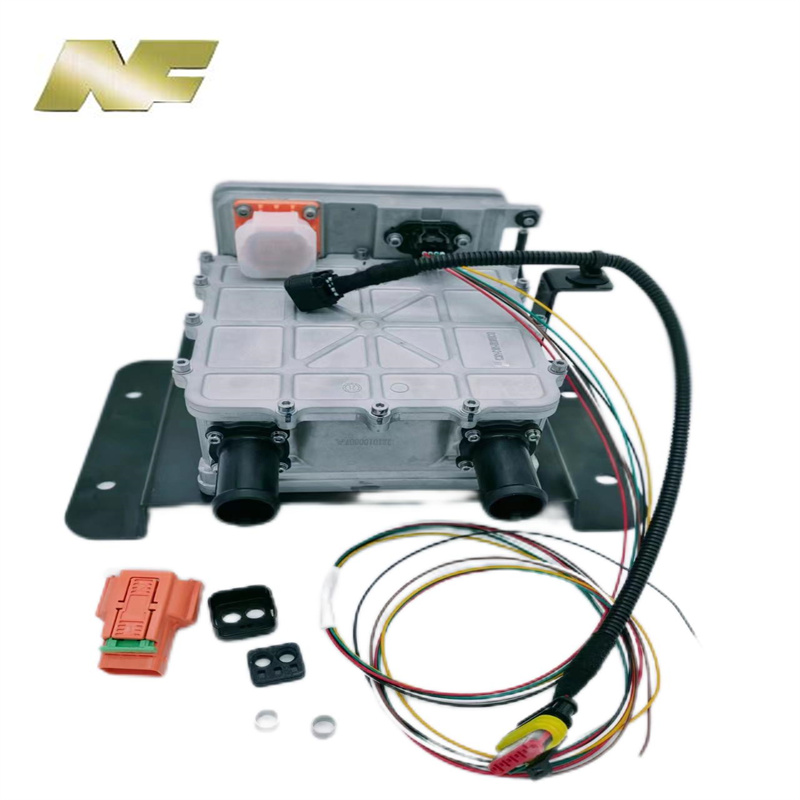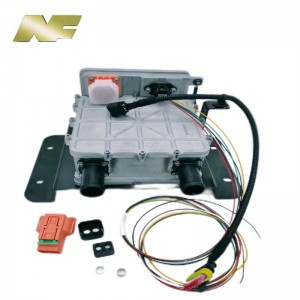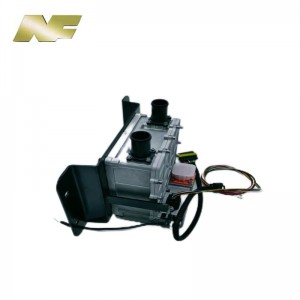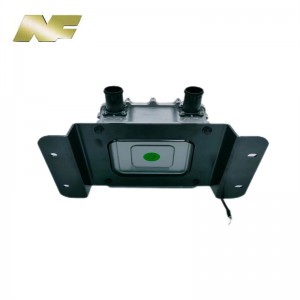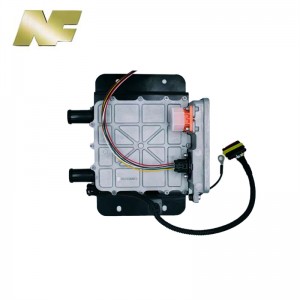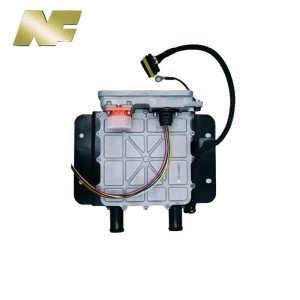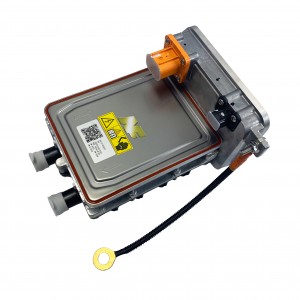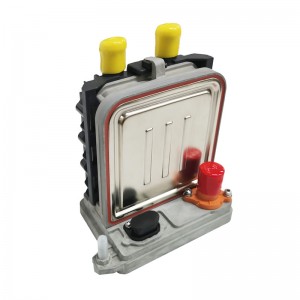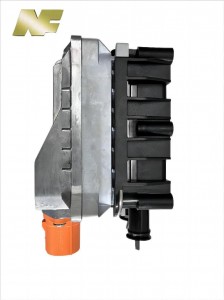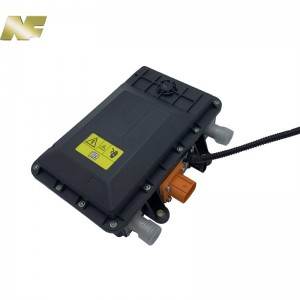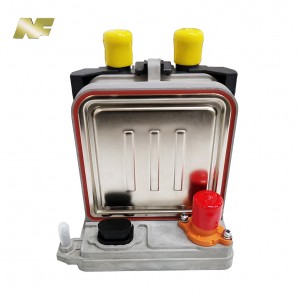NF 9.5KW HVH EV Coolant Heater 600V High Voltage Coolant Heater 24V PTC Coolant Heater
Technical Parameter
| Size | 225.6×179.5×117mm |
| Rated power | ≥9KW@20LPM@20℃ |
| Rated voltage | 600VDC |
| High voltage range | 380-750VDC |
| Low voltage | 24V,16~32V |
| Storage temperature | -40~105 ℃ |
| Operating temperature | -40~105 ℃ |
| Coolant temperature | -40~90 ℃ |
| Communication method | CAN |
| Control method | Gear |
| Flow range | 20LPM |
| Air tightness | Water chamber side ≤2@0.35MPaControl box≤2@0.05MPa |
| Degree of protection | IP67 |
| Net weight | 4.58 KG |
Advantage
We are the largest PTC coolant heater production factory in China, with a very strong technical team, very professional and modern assembly lines and production processes. Key markets targeted include electric vehicles. battery thermal management and HVAC refrigeration units. At the same time, we also cooperate with Bosch, and our product quality and production line have been highly recoanized by Bosch.
Application

CE certificate


Description
As the world adapts to a rapidly changing climate, the automotive industry is being forced to redesign vehicles to minimize environmental impact. One innovation that has become popular in recent years is the high-voltage electric coolant heater. This cutting-edge technology not only provides an efficient heating solution but also reduces the car's carbon footprint. In this blog, we will explore the advantages and working principles of high-voltage electric coolant heaters or electric vehicle coolant heaters in the automotive sector.
Learn about high-voltage coolant electric heaters:
In conventional vehicle heating systems, a fuel such as gasoline or diesel is used to heat the coolant. However, the advent of high-voltage electric coolant heaters revolutionized this concept. These heaters use electricity as their primary energy source and are cleaner and more efficient than traditional heaters.
Advantages of high-voltage coolant electric heaters:
1. Environmentally friendly: Electric coolant heaters do not require the use of fossil fuels and reduce greenhouse gas emissions. As the world seeks to transition to renewable energy, these heaters align with sustainability goals.
2. Fuel efficiency: By utilizing electricity directly, high-pressure heaters eliminate the need for a separate internal combustion engine to generate heat. As a result, the overall energy efficiency of the vehicle is significantly improved.
3. Fast and efficient heating: The high-pressure heater heats up quickly to ensure that the interior of the car quickly reaches the required temperature. This is particularly beneficial in cold weather conditions, improving comfort and safety.
4. Preconditioning and range optimization: The electric coolant heater can be programmed to preheat the cab while the vehicle is still charging. This feature is especially convenient for electric vehicles as it helps optimize the vehicle's range by minimizing the amount of battery power required for heating.
Working principle of high-voltage coolant electric heater:
High-voltage electric coolant heaters are composed of multiple components that work seamlessly together to provide efficient heating:
1. Electric heating element: This element converts electrical energy into heat energy. Typically, this element consists of a high-resistance coil that heats up when current passes through it.
2. Coolant circulation system: Coolant, such as ethylene glycol or propylene glycol, circulates within the heater. The coolant absorbs heat from the electric heating element and then circulates through the vehicle's engine and heating system.
3. Control module: The control module regulates the power input of the electric heating element to ensure consistent and safe heat output. It can also integrate the heater with the vehicle's electrical system, allowing for programmable and remote control capabilities.
in conclusion:
High-voltage electric coolant heaters have changed the way we heat our cars. These innovative systems offer many benefits such as improved fuel efficiency, reduced emissions, rapid heating and range optimization. As automakers strive to create more environmentally sustainable vehicles, the adoption of high-voltage electric coolant heaters is becoming more common. Embracing this technology will undoubtedly lead our automotive industry towards a greener, more energy-efficient future.
FAQ
1. What is an electric vehicle coolant heater?
An EV coolant heater is a device used in electric vehicles to heat the coolant in the vehicle's heating and cooling system. It helps maintain optimal temperatures for the vehicle's battery, cabin, and other components.
2. How does an electric vehicle coolant heater work?
Electric vehicle coolant heaters typically use electricity from the vehicle battery or an external power source to heat the coolant in the vehicle system. The heated coolant then circulates throughout the system, providing heat to the cab and maintaining battery temperature.
3. Why do you need an electric vehicle coolant heater?
Electric vehicle coolant heaters are necessary to ensure optimal performance and efficiency of your electric vehicle. It helps warm up your vehicle's components, including the battery, improving your vehicle's efficiency in cold weather and extending your vehicle's range.
4. Can I install an EV coolant heater on my existing EV?
Yes, in most cases, EV coolant heaters can be retrofitted into existing EVs. However, it is recommended to consult a professional technician or the vehicle manufacturer to ensure compatibility and proper installation.
5. How does an electric vehicle coolant heater affect the driving range of an electric vehicle?
Electric vehicle coolant heaters can have a positive impact on the range of electric vehicles in cold climates. By keeping the battery and other components at optimal operating temperatures, you can increase your vehicle's range compared to not using a coolant heater.
6. Can the electric vehicle coolant heater be used while the vehicle is charging?
Yes, an electric vehicle coolant heater can be used while the vehicle is charging. Many electric vehicles have the ability to precondition the cabin and use a coolant heater to preheat the battery while still plugged in.
7. Are there any safety precautions when using an electric vehicle coolant heater?
When using an electric vehicle coolant heater, the manufacturer's guidelines and recommendations must be followed. Overheating of coolant may cause damage to vehicle components and appropriate measures should be taken to ensure safe and efficient operation.
8. Does the electric vehicle coolant heater consume a lot of power?
Electric vehicle coolant heater power consumption varies by model and use. However, the energy consumption of a coolant heater is relatively low compared to powering the entire vehicle.
9. Can an electric vehicle coolant heater help defrost the vehicle windshield?
Yes, in many electric cars the warm coolant circulated by the coolant heater can also be used to assist with windscreen defrost. This feature helps improve visibility and ensure safe driving in cold conditions.
10. Can I control the electric car coolant heater remotely?
Some electric vehicles offer the option to remotely control the coolant heater using a smartphone app or vehicle-specific software. This feature allows users to pre-condition the vehicle temperature before entering the vehicle, thereby increasing comfort and convenience.

